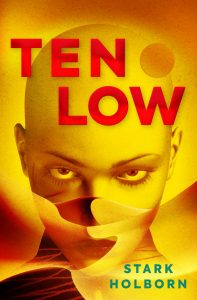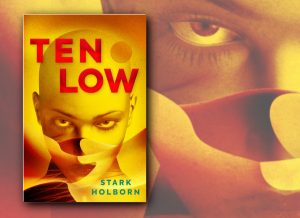TEN LOW by Stark Holborn
The eponymous protagonist of Stark Holborn’s far future set sci-fi novel is an ex-convict with a past she is trying to make amends for, but chance has dealt her a harsh hand and continues to torment her with half glimpsed possibilities along a path to redemption.
 The world, or rather universe, of Holborn’s imagination sprawls across several systems, planets and moons, with a civilisation recovering from a civil war with the rebel “Free Limits” brutally supressed by the governing “Accord.” However, the novel’s action focuses on the desolate moon Factus. For all the emphatic nature of their victory, the Accord’s grip on its outer possessions is tenuous. Government is in name only, with plenty of spaces for people to carve out an existence of competition and hostility.
The world, or rather universe, of Holborn’s imagination sprawls across several systems, planets and moons, with a civilisation recovering from a civil war with the rebel “Free Limits” brutally supressed by the governing “Accord.” However, the novel’s action focuses on the desolate moon Factus. For all the emphatic nature of their victory, the Accord’s grip on its outer possessions is tenuous. Government is in name only, with plenty of spaces for people to carve out an existence of competition and hostility.
Factus resembles Georgian and Victorian era Australia, a place where the ruling empire dumped its unwanted and unwashed, and where the diligent and entrepreneurial might still corner themselves some kind of life and relative prosperity. Another Australian echo is in the utter failure of attempts to import cattle and other animals for farming leaving cultivated snakes as the main supply of food, alcohol and entertainment. Ten Low – forenamed for the length of her sentence in years and surnamed by the whim of the prison guard who released her – is one among many ex-cons and colonist factions who have found the freedom of Factus is itself a kind of imprisonment. Factus reminded me of the desolate windswept Ceti Alpha V where Ricardo Montalban found his people exiled In Star Trek II – The Wrath of Khan. However, in its political organisation, Factus also has echoes of the Mad Max franchise, isolated communities, charismatic leaders and the loner Ten Low weaving her way between them. It also has something of the wild west and its frontier towns and ribbons of railway line civilisation that Holborn evoked so well in her Triggernometry series.
Ten Low – ex Free Limits warrior – wanders this dry dusty world (scarcely more welcoming than Perseverance’s current Martian crater) on a motorised mule, drawing on her past life as a medic to try and save enough lives to make up for the ones her crimes killed. Which is why she is drawn to try and save the sole survivor from a crashed spaceship, who turns out to be not simply a child and not just a former enemy from the Accord. Gabrielle Ortiz is a biologically augmented child trained in strategy, tactics and hand to hand combat to be more than a child soldier, no less than a child general. I watched Logan recently, and I found myself picturing Ortiz as something like the ferocious physicality of Laura carrying the arrogant mentality of Napoleon.
However, saving Ortiz is a more complex task even than their historic differences might suggest, as the full range of perils and adversaries on Factus pursue the pair – both together and separated – in and out of some bizarrely named places and company. While Holborn toys with toponomy my favourite location was “At Least,” the most battered and fragile of Factus’s many vulnerable communities, earning its name because
‘Place is hit so often by Seekers and bandits, only thing people can say is “at least it’s still there.”’
There is a great deal to admire and enjoy in this well-crafted story, with its terse present tense first protagonist. I will mention, as I sometimes do, that Holborn’s vision of the future is wonderfully and seamlessly diverse. It is accepted that Ten Low’s associates vary in their sexuality and their pronouns without this even being an issue the characters need to draw attention to – they are far too busy surviving to worry about what (or who) might be in anyone else’s underwear. I suspect I will find myself making this observation less often in the future, not because books will become less diverse, but because such diversity in fiction will become as prevalent, accepted and unworthy of special comment as the diversity it reflects in real life should also be.
While the setting is emphatically Sci-Fi, reminiscent of any number of arid planetoids from the worlds of Dune, Star Trek, Star Wars and all, there is a kind of mysticism embedded in Holborn’s plot and world building. Factus in general, and Ten Low in particular are haunted by the Ifs. These are tenuous auras of possibility, like an out of control infinite improbability drive crossed with the three Norns, who congregate at moments of tension and crisis and seem determined to precipitate the most chaotic outcome. They give Ten Low glimpses of possible futures, multiple paths – most of which seem to lead to multiple deaths, and leave her fractions of a second to make a choice. It reminded me of my very faint grasp of quantum electro dynamics, and how it turns out that the ultimate path of individual photons of light is more a matter of statistical probability chosen from many options, than the singular certainty predicted by classical mechanics. However, in Holborn’s sure grasp the Ifs smack more of the fantastic than the science fiction – the “supernatural accepted” more than the “supernatural explained.”
As with Triggernometry and Advanced Triggernometry, Holborn’s prose is lyrical, at times poetic. The first lines of any book always have so many jobs to do, in capturing and anchoring the reader’s interest, that they rarely present an opportunity for simple wordcraft to soar. I can think perhaps of just three books where I would highlight the opening sentences with a kindle note of “nice line!”
One would be Jane Austen’s opening to Pride and Prejudice, the next would be Mark Lawrence’s start to Red Sister, and the third is this line from Ten Low.
I hunch closer to the sputtering fire. The darkness is vast, hiding countless lives, but down here the wind just coughs dust into my eyes.
There are many other lines where Holborn demonstrate how it is not which words you use, but how you use them that grab a reader’s attention and make them sit up and take notice.
An injured soldier
He half-lifts his head to stare around, ropes of strain in his neck.
On a doomed rebellion
And the longer we fought the harder every choice became, until the fire we started to light our way began to consume the future.
On an antagonist whose fate the Ifs have shown to Ten Low
[He] stands before me, violent with life. It seems impossible that soon it will be snuffed out.
Ten Low in repose with a smoking companion
Silas stealthily lights his pipe…and my eyes are heavy with the bitter smoke. The light drips like hot honey through the windshield to where I sit,
Ten Low and the child general track back and forwards across the surface of Factus, their paths sometimes separate, sometimes entwined as circumstances drive them into dealings with every faction of the barren moon a place that ‘Makes everything dryer than a drunk’s eyeball.’
Ten Low has a past – what ex-con wouldn’t – but it is one she only grudgingly shares with the reader still less her companions. However, her voice is always captivating and her plight compelling. She gathers an engaging crowd of allies and – for all their desperation and the desolation of their setting – the choices they make are always logical, necessary even. Despite the illusion of possibilities that the Ifs might suggest, there is only ever one path for Ten Low, and one choice for the reader – to follow her.
Ten Low is due for release June 2021. You can pre-order from:
Waterstones | Amazon.co.uk | Amazon.com | Penguin Random House


[…] I wrote reviewing Ten Low here and Hel’s Eight here, the two previous books in Holborn’s Factus series could be read as a […]
[…] You can read my review of Holborn’s first excursion into this compelling but hostile landscape here. In Hel’s Eight Stark delivers more of the desperate dystopian existence, an endless struggle for […]